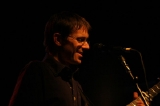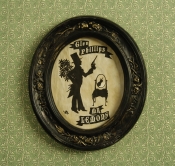|
Glen Phillips |
|
|
|
Another milestone for Way Cool Music, Glen Phillips was kind enough to grant the first of our update interviews. Since our initial interview last May, Phillips has been busily touring as a solo artist, writing and recording a new CD, and preparing for an extensive European adventure with his family. Read about this talented artist taking more control over his destiny, creating his newest CD, and how this summer's Toad the Wet Sprocket tour became a reality. Don't forget to read Phillips' responses to our new "7 More Questions."
|
|
|
Way Cool: |
Since our last interview, a lot has changed in your career including your label, management, and booking. Can you talk a little bit about those changes and how things are?
|
| |
|
Glen Phillips: |
I’ve been trying to make things realistic. I’ve been doing this for a long time, and there’s always been emphasis on the next step and what will happen when we have some luck and what will happen when things start going really well. I notice that they don’t and we’re left with nothing instead of being left with what we would have had had we just put one foot in front of the other and done things according to what we actually had. So, it’s just been that.
I just want to feel like my job is making music. Until recently, my job has been trying to make people in places of power happy more than I like. I was just really tired of it. I was exhausted and unrewarded. So, my goal now is to make more music and be home more often. I’m just trying to make it all work.
|
|
 |
|
|
|
WC: |
How did you decide on Neilson Hubbard to produce Mr. Lemons? |
| |
|
| GP: |
We were friends. We had written a couple of songs together. At one point, I was going to go in with Neilson and Brad Jones [ Josh Rouse, Garrison Starr], but circumstances focused me elsewhere. But, I really like working with him. I felt more like we were working on an album as peers than I’ve ever felt before. He’s not some maniacal multi-instrumentalist; he’s just a guy with really good taste. It was a really good collaboration. It was cool to go in with a guy who was already a friend and was someone I had been hanging out with instead of meeting a producer. It was a different kind of relationship and I felt that this was more “my album” than any album I’ve made before, which I really liked. |
| |
|
WC: |
How was making this album different from Winter Pays for Summer or Abulum? |
|
|
GP: |

|
|
Well, it was very quick. We had two one-and-half-week intervals. We would do a week and a half and I would go on tour. Then I came back for a second week and a half. Then he came to Santa Barbara with Andy [Hunt] to mix and that was it. It worked. It was super quick. There wasn’t any pressure from anybody for it to be anything other than what we wanted and that was nice. I mean in terms of, “What’s the single?” or “Oh! It’s too mellow. People aren’t going to like it if it’s too mellow.” There was none of that. We were very much in agreement on the kind of record we wanted to make. I had wanted to start with vocals. I had wanted to start with a really simple performance and only add what was necessary. Instead of asking the question, “Oh, it’s not working. What do we add?” we asked, “Oh, it’s not working. What do we take away?” It was a cool process. The whole thing was very low key, which I really like. |
|
| |
|
WC: |
The new CD has a live, raw feel to it. Was that part of the big picture or was it just the end result? |
| |
|
GP: |
We started with performances instead of starting with click tracks or drums. It is by design a little more raw. It’s not very finessed. I wanted it to be more performance focused and to feel more like the live show; for it not to be such a convoluted production. I think we achieved that. I wanted it to be pretty and I didn’t want it to be rock. I was in a rock band once so I’ve had a lot of pressure to keep being in a rock band and I’m not. So, this doesn’t sound like that. |
|
|
WC: |
You do a number of different covers when you play live. How did you decide to cover ‘I Want a New Drug’ and how did you arrive at the arrangement? |
| |
|
| GP: |
My friend Jessie suggested it as a joke and I thought it was a great idea. I figured out pretty quick what I wanted to do with the groove. I never listened to the original so I just went in and had my own idea about it. The arrangement was just on the fly. Some of the songs we built up from a vocal and a guitar and some of the songs we started with the whole band. That was one where it was live lead vocal with everyone playing together. It just kind of arranged itself. |
| |
|
WC: |
Have you listened to Huey’s version since? |
|
|
GP: |
Yeah. Different! The phrasing is different and the melody is different. I basically rewrote it. But I love the lyric. |
|
|
WC: |
The tracks on Mr. Lemons span many years. ‘Marigolds’ is older and ‘Joyful Noise’ is very new. How did you choose which songs to record for the CD? |
|
|
| GP: |
For the older songs, it was often songs that had been pushed to the side on other albums because they were too mellow. The newer stuff, I wrote and brought in. I wanted to make a more mellow CD so the newer songs I was writing were more open and spacious and fit well, I think. It just seemed like it was a working group. I didn’t even have all the songs in the beginning. ‘The Next Day’ and ’Thank You’ were pretty much finished right before they were recorded. ‘The Next Day’ I wrote at Neilson’s house. ‘Thank You’ I hadn’t planned on recording. There were other songs that were floating around. We just cut it down.
There are not any extra tracks, no b-sides. We just did the ones that would be on the record. We had a pretty good idea of the mood we wanted and anything that fit into that, we pretty much did. There’s a decent amount of new stuff on it. I could have gone into a really long process of writing and judging. I had a pretty long list of songs to choose from. I could have done a whole new batch and run it by a bunch of people and gone to committee and tried to get a record deal, but I just couldn’t handle that anymore. I just wanted to make a record. And the result is just as good, if not better, than the records I agonized over. I think The Stones and The Beatles had the right idea when they just kept making music and didn’t let the suits rule their lives.
|
| |
|
WC: |
Now you’re getting closer to the one record a year goal if you are the only member on that committee. |
|
|
| GP: |
Yeah, I just have to get off the road long enough to have time to make more records and write more songs. That’s the big thing. At this level of touring, playing 6 shows a week and driving lots, I’m not really eating 3 meals a day, not to mention not writing songs. I’ll have to get to a level where I can stay home more or downgrade our standard of living where staying home more is feasible. So, we’ll figure that out. |
|
 |
|
| |
|
WC: |
What made you decide to play with Toad this summer? |
|
|
GP: |
I finished this record and was wondering how I would let everyone know I had this great new album that was worth hearing without a record label. Todd called and asked if I wanted to do some shows. He offered to let me play a few songs in the middle of the set and work the new album. He laid it out in a way that made it very easy for me to say, “Great! I can play to 1,500 people every night who already love my songs. I can play my new songs for them.” These are people who I haven’t been able to reach solo. I can play some songs and Toad can have a good time, and I can make a living on the road as well.
There’s no pressure within the band, and the business people have been really protective of us this time around. (Last time) There was a lot of pressure to get back to it. There was this thinking that, “Well, you’ve had your little tiff. Now let’s get back on the gravy train.” None of us want to. We like the idea of playing a few shows, and if it’s the end of it, ending it on a good note. And if it’s not the end of it, getting back because we’d like to… maybe playing a few shows a year. It’s not about making a new record. None of us are interested in that. Getting to play the old songs is great, but we all have new projects that we like and are interesting to us, that we feel like is something that’s moving forward. I think we all agreed when Toad stopped that we had said all we needed to say together. This way everybody’s happy and I can let people know about the new record.
Toad had this very idealistic thing where we never put anybody before anybody else. So, we would all do the interviews and nobody knew our names. On the one hand, it was very idealistic and good. On the other hand, here we are trying to make music and nobody knows who we are as individuals. It’s pretty frustrating.
|
|
|
WC: |
It’s amazing that people can consider Toad their favorite band and not continue to follow your career. |
| |
|
| GP: |
Well, I haven’t really made it easy for them. I haven’t made a lot of records. And the first record was kind of reactionary. I think Winter Pays For Summer and this record are incredibly strong. But, I didn’t really do a good job with Winter Pays For Summer in making a record that reflects what I do live. Once again, not everyone was on the same page about what we were doing, myself included. I made a rock record and then went out touring solo acoustic, which is an incredibly stupid thing to do. We weren’t effective in getting me in front of adults.
It’s been really interesting playing these listening rooms over the past few months and seeing who turns out. I get rooms full of people who have kids and have their babysitters at home and they’re adults. They sit there and listen and they’ve been wonderful shows. I feel like I’m finally playing in the right rooms and things are appropriate. Because I’ve had this pop background, and because it’s been a long time getting in the right venues, I kind of have to prove myself in this world. In the meantime, I have had people who have followed me. It hasn’t been terrible! I’m pretty lucky, but it is always strange to see the attention the band gets comparatively. I can either be really glad to have that or let it bug me for the rest of my life. I’m trying to be grateful for it.
When I think of albums I want to make and things I want to do, I have a laundry list of stuff that, if there’s any possible way to do it, would be so exciting to me! I feel like musically and creatively, I’m so ready to move forward in so many ways. If I can ever get off the road and quit struggling long enough to get these ensembles together and do these other projects, that’s going to be wonderful. Some of them are just really quiet albums. One of the ideas was a concept for this album. I almost did it in Santa Barbara with Jim Wood from Dishwalla. We were going to record it in an open, ambient room. We were going to do it live in a room that was so reverberant that everybody had to play as minimally as possible and really use the acoustic space. So, I want to do some bare bones acoustic records like that. I want to do some very studio-oriented projects. I have a concept for a band that I really want to get together that’s somewhere between Kirton and Arcade Fire. There’s the next Mutual Admiration record that we all need to get writing for. So, there’s a lot going on. I just need to start making records and stop being about the past and the business.
|
| |
|
| WC: |
So how are you going to make records this fall in Europe? |
| |
|
| GP: |
That’s a good question. We’re going to spend some of the time traveling and some of the time in steady places. I’ll probably make some friends over there. Depending on the kind of record I want to make and the songs I write, I know some people over there that I’d love to work with And there’re other people I’m sure I’ll find. |
| |
|
WC: |
Now itís time for a new set of seven questions. |
|
|
| |
|
|
|

|
|
|
What was your first concert?
|
|
Men at Work with Mental as Anything opening. |
| |
|
|
What's your favorite album cover art?
|
| |

|
|
Winter Pays for Summer. I have to give credit to the wife! |
|
| |
|
|
What book or author has most influenced you?
|
|
Kurt Vonnegut |
| |
|
|
What was your favorite childhood toy?
|
|
I really like the magnetic wheel that would spool up and down (Whee-lo).
|
| |
|
|
What would be the title to the movie of your life?
|
|
Sleep Well. |
| |
|
|
What is the worst advice you've ever received?
|
|
I can’t think of any advice I’ve received that’s worse than decisions I’ve made on my own. |
| |
|
|
When was the last time you partied like it was 1999?
|
|
Probably 1992. |
|
|
|
|
|
To find out more information about Glen Phillips. visit his website at www.glenphillips.com. |
|
|